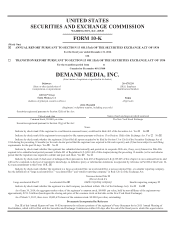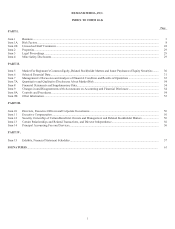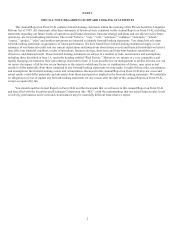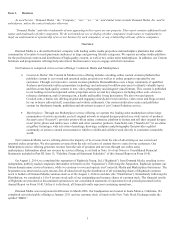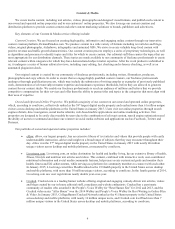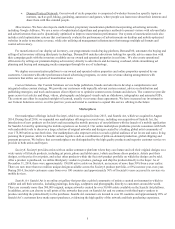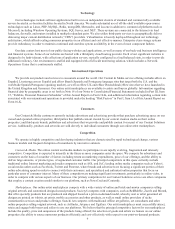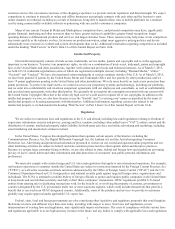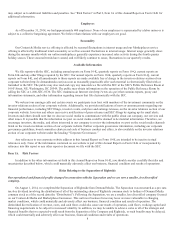Enom 2014 Annual Report Download - page 13
Download and view the complete annual report
Please find page 13 of the 2014 Enom annual report below. You can navigate through the pages in the report by either clicking on the pages listed below, or by using the keyword search tool below to find specific information within the annual report.10
Risks Relating to our Business
If Internet search engines continue to modify their methodologies, traffic to our owned and operated online properties and to our
customers’ online properties could decline significantly.
We depend on various Internet search engines, such as Google, Bing and Yahoo!, to direct a significant amount of traffic to our
owned and operated online properties and our customers’ online properties. For the year ended December 31, 2014, based on our
internal data, a majority of the traffic directed to eHow.com and Livestrong.com came directly from these Internet search engines and
more than half of the traffic from search engines came from Google. Changes in the methodologies or algorithms used by search
engines to display results could cause our owned and operated online properties or our customers’ online properties to receive less
favorable placements or be removed from the search results. Internet search engines could decide that content on our owned and
operated online properties or our customers’ online properties, or the size and placement of ad units displayed on webpages hosting
our content, is unacceptable or violates their corporate policies. Internet search engines could also view changes made to our owned
and operated online properties or our customers’ online properties unfavorably, leading to lower search result rankings and a decrease
in search referral traffic.
Google, Bing and Yahoo! regularly deploy changes to their search engine algorithms. Since 2011, we have experienced
fluctuations in the total number of Google search referrals to our owned and operated online properties, including eHow.com and
Livestrong.com, and to our customers’ online properties. During 2013, we experienced several negative changes in Google referrals to
our owned and operated online properties that, in the aggregate, were larger in magnitude than those that we previously experienced,
and we have and may continue to experience negative changes in Google referrals to our owned and operated online properties.
Beginning in 2014, Bing and Yahoo! began to implement similar changes to their search engine algorithms. These changes have
resulted, and may continue to result, in substantial declines in traffic directed to our owned and operated online properties. Any future
or ongoing changes that impact search referral traffic to our owned and operated online properties or our customers’ online properties
may result in material fluctuations in our financial performance.
The recent changes to search engine algorithms by Google, Bing and Yahoo!, and any future changes that may be made by
search engines that negatively impact the volume of referral traffic, could further negatively impact our business. Any reduction in the
number of users directed to our owned and operated online properties or our customers’ online properties would likely negatively
affect our ability to earn revenue. If traffic to our owned and operated online properties or our customers’ online properties declines,
we may be unable to cost-effectively replace lost traffic, which would adversely affect our business, financial condition and results of
operations.
We are dependent upon certain arrangements with Google for a significant portion of our revenue. A termination of, or a loss of
revenue generated from, our agreements with Google would have a material adverse effect on our business, financial condition
and results of operations.
We have an extensive relationship with Google and a significant portion of our revenue is derived from advertising provided by
Google. For the years ended December 31, 2014, 2013 and 2012, after giving effect to the Separation, we derived approximately 50%,
56% and 60%, respectively, of our total revenue from our arrangements with Google. Google provides cost-per-click advertisements and
cost-per-impression advertisements to our owned and operated online properties and we receive a portion of the revenue generated by
such advertisements. We also utilize Google’s DoubleClick Ad Exchange, an auction marketplace that allows us to sell display
advertising space on our owned and operated online properties and our customers’ online properties. Our services agreement with
Google, which governs our various advertising relationships with them, currently expires in October 2016. In addition, we use Google’s
DoubleClick ad serving technology to deliver advertisements to our and our customers’ online properties. Google has the right to
terminate these agreements prior to their expiration upon the occurrence of certain events, including if Google reasonably believes that
our use of its services violates the rights of third parties, and other breaches of contractual provisions, a number of which are broadly
defined. If our agreements with Google are terminated, or we are unable to enter into new agreements with Google on terms and
conditions favorable to us prior to the expiration of the current agreements, we may not be able to enter into agreements with alternative
third-party advertisement providers or for alternative ad serving platforms on acceptable terms or on a timely basis or both.
Furthermore, our advertising agreement with Google may not continue to generate the same level of revenue that we have
received from such arrangements during past periods for a variety of reasons, including a reduction in the amounts Google is able to
charge advertisers and the possibility that our online properties do not generate sufficient traffic to realize our maximum revenue share
percentage with Google. Our ability to generate online advertising revenue from Google also depends, in part, on Google’s assessment
of the quality and performance characteristics of Internet traffic resulting from online advertisements placed on our owned and
operated online properties and on our customers’ online properties. In addition, Google may at any time change the nature of, or
suspend, the services that it provides to online advertisers and the catalog of advertisers from which online advertisements are sourced,
or modify its policies with respect to how advertisements may be displayed on a webpage. These types of changes or suspensions
would adversely impact our ability to generate revenue from our advertising agreement with Google. Any termination of or change in


